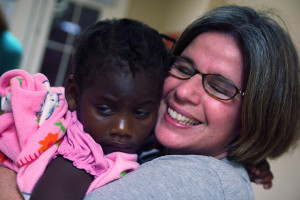 Meeting your adoptive child for the first time might be a magical moment, but it also could be traumatic or disappointing for either or both you and your child. Adoptive parents look forward to this day with intense anticipation, but this anticipation may lead to unrealistic expectations. You are excited, nervous and scared. Remember, your child is also feeling an intense mixture of emotions. Don’t expect this moment to be love at first sight. How your child responds to you at your initial meeting will be determined by many factors, including, but not limited to, the age of the child, his or her individual personality type, the child’s social history, level of trauma experienced, what type of care your child has been provided, such as institutionalized care versus foster care, and even if your child is simply tired or hungry.
Meeting your adoptive child for the first time might be a magical moment, but it also could be traumatic or disappointing for either or both you and your child. Adoptive parents look forward to this day with intense anticipation, but this anticipation may lead to unrealistic expectations. You are excited, nervous and scared. Remember, your child is also feeling an intense mixture of emotions. Don’t expect this moment to be love at first sight. How your child responds to you at your initial meeting will be determined by many factors, including, but not limited to, the age of the child, his or her individual personality type, the child’s social history, level of trauma experienced, what type of care your child has been provided, such as institutionalized care versus foster care, and even if your child is simply tired or hungry.
Here are some points to help you prepare and to help your child and you navigate this moment and transition more easily:
- Remember you are a stranger to your child and he or she may be frightened of you.
- Your child may have never seen a Caucasian individual or had much exposure to an adult male.
- Anticipate your child may cry or engage in temper tantrums or the child may be very quiet or withdrawn.
- Your child may ignore you; let the child come to you when he or she is ready, don’t force the interaction.
- Keep your voices soft and soothing.
- Wear neutral colors.
- Don’t wear heavy perfumes or colognes as your child identifies his or her world through all their senses, including smell.
- Bring toys that are age appropriate, but not loud; you don’t want to bombard the child with too much stimulation.
- There may be a language barrier; create a picture book you can utilize to communicate with by pointing to a picture to help the child communicate his or her needs, such as if they are hungry, tired or need to go to the bathroom.
- Ask that the child be able to keep a favorite toy or blanket from the caregiver; it may provide a familiar comfort.
- Be patient! Remember your other close relationships were not established in an instant.
- Don’t take bad behaviors personally or become upset, your child will feel your emotions.
- If your first meeting with your child is after he or she was escorted to his or her adopted country, keep the welcome party at the airport very small and to include only immediate family such as siblings. Too many strangers and camera flashes going off may frighten your child and be too overwhelming.
Young babies and children ages 4 to 7 typically have an easier time at initial meetings than do toddlers. A toddler is old enough to understand their world is changing and that you are a stranger but not yet old enough to have these changes explained to him or her.
Remember that your child is being introduced to new adults in their lives and that you may look different, smell different, talk different and even feel different. It is most important to keep expectations low on how well this moment goes and not to take anything personally! How quickly a child bonds and attaches to you and you to them will be different for each child. It is more important to work on bonding and attachment first and rules and discipline later. How this day unfolds will eventually become a day of sentimental remembrance. Embrace the day and be prepared for anything!
Photo Credit: Steven Depolo
